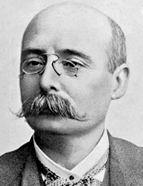

In 1884, Consiglieri Pedroso was a member of seven European scientific institutions (Manual…, 1884, p.1). He became an honorary member of the Royal Academy of Sciences in 1891 and a full member in 1905. He became a member of the Lisbon Geographical Society in 1897, vice-president in 1900 and president in 1909. In addition to this career, he kept working on his political career, which was characterised by his attachment to republicanism, his defence of the gradual establishment of the republic and his commentary on international affairs. In 1871, he contributed to periodicals Gazeta do Povo and República Federal. In 1873, he wrote articles in Democracia under the pseudonym "Spartaco". In 1874 he collaborated with the Spanish newspapers Europa and Miscellanea Illustrada. He codirected Republica - Egualdade - Solidariedade, a federalist and municipalist journal, with José Carrilho Videira, between 28 November 1874 and 4 April 1875. Sebastião de Magalhães Lima was a collaborator. In 1889, he owned the newspaper Os Debates. Between 1889 and 1910 he collaborated on the magazine Brazil-Portugal: between 1901 and 1910, he wrote the chronicle "Política Internacional". In 1908 he collaborated with A Lucta.
On 25 March 1876, at the founding of the Democratic Republican Centre, he was part of the Republican Party Board. On 10 June 1883, he joined the board of the Portuguese Republican Party. He represented the party in the Chamber of Deputies between 1884 and 1889 and in the Lisbon City Council, as a councillor, between 1886 and 1889. At the PRP congress in August 1887, he proposed a coalition with Barjona Freitas's Dynastic Left. This connection led to his name being omitted from the list of candidates to the Chamber of Deputies in 1889, an event that ended his political career.
He remained faithful to the PRP's legalist matrix and tried unsuccessfully to unite the party with the Manifesto-Programa in 1891 and to join forces with the Progressive Party in 1896. The revolutionary Grupo Republicano de Estudos Sociais [Republican Social Studies Group] was created that year. In a letter addressed to the Board, which was published in Os Debates in 1889, Consiglieri Pedroso recognised that the 1887 proposal had not met with consensus. He admitted that he would not represent all factions of the party in the Chamber. After this setback, he focussed on expanding primary and popular education. Between 1886 and 1888 he published Propaganda Democrática [Democrat propaganda], a collection that aimed to improve the civic education of the people, publicise republicanism and provide knowledge of history. Highlights are O que é a República [What is the Republic?] and A Casa de Bragança [The House of Bragança]. He directed the First and Second Pedagogical Congresses, respectively in 1908 and 1909, as the president of the Liga Nacional de Instrução [National Instruction League], an institution influenced by the Freemasonry. Consiglieri Pedroso received the light in 1888 in the Simpatia lodge (Simpatia e União from 1890), under the obedience of the Grand Orient of Portugal. He defended the application of the educational methods of Froëbel and Pestalozzi and the municipalisation of education.
This work is financed by national funds through FCT - Foundation for Science and Technology, I.P, in the scope of the projects UIDB/04311/2020 and UIDP/04311/2020.
